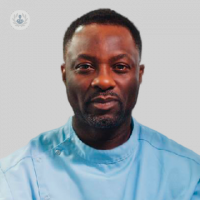The Bioclear Method: is it right for you?
Written in association with:The Bioclear Method is an affordable, minimally invasive and high-tech treatment that can give you white, symmetrical and natural-looking teeth.
Over the years, our teeth are exposed to wear and tear and discolouration. And while there are many treatments around that can help you improve your smile, Bioclear is one of the few that will give you long-lasting results without damaging or removing your natural teeth.

In this article, Dr Olurotimi Adesanya, a leading dentist based in Kent, explains all the advantages and disadvantages of Bioclear and whether this treatment is a good fit for you.
What is the Bioclear method?
Bioclear is a minimally invasive and cost-effective treatment to improve the appearance of your teeth. It involves using clear, thin shells filled with composite material (matched to the colour of your teeth) that cover your teeth. These shells are then removed leaving behind an evenly contoured composite that has a beautiful shine and is smooth to touch.
How does Bioclear differ to traditional methods used in dental bonding?
|
Bioclear |
Traditional methods |
|
High stain resistance which is similar to porcelain. |
Traditional methods polish well at first but after a few months, stains begin to form in the gingival margins and small voids appear in the facial and interproximal margins. |
|
Produces a solid, monolithic strength restoration. |
Gaps are common and the incisal edges are at a high risk of fracture. |
|
Tooth restoration lasts for decades. Patients remain happy with the aesthetic result for many years. |
Liable to fracture and the aesthetic result diminish in a short timeframe. |
|
Maintains colour uniformity and brightness and patients remain satisfied. |
Traditional composite has incisal translucency. They tend to look grey and patients become less satisfied over time. |
How is the Bioclear method different from porcelain veneers?
With Bioclear veneers there is less tooth preparation needed compared to using porcelain veneers. When you have porcelain veneers bonded to your teeth, a layer of tooth enamel needs to be removed. Once this happens, there is no way to reverse the procedure without replacing the tooth. Bioclear, on the other hand, is reversible and can even be done in a single visit, as opposed to at least two visits for porcelain veneers over a span of a couple of weeks.
What are the benefits of using Bioclear?
To summarise, there are many overall benefits to using Bioclear to improve the appearance of your teeth:
- Treatment is cost-effective
- Can be completed in a single visit
- Reversible
- Preserves and respects the biomechanics of natural teeth
- Gentle on the gums
- Can thicken and opacify an aged and translucent tooth
- Replaces a deficient, missing and diseased tooth structure
- Lasts longer than 10 years
Is the Bioclear method easily available or is it still relatively new?
Bioclear was founded in 2007 by dentist and inventor Dr David Clark with the vision of creating a new system of products for a modern approach for restorative dentistry.
Nowadays, there very few accredited practitioners that can provide Bioclear in the UK and I am one of the few.
Dr Olurotimi Adesanya practises at Watling Street Dental Care. If you are interested in Bioclear, head to his Top Doctors profile to book an appointment with him.


